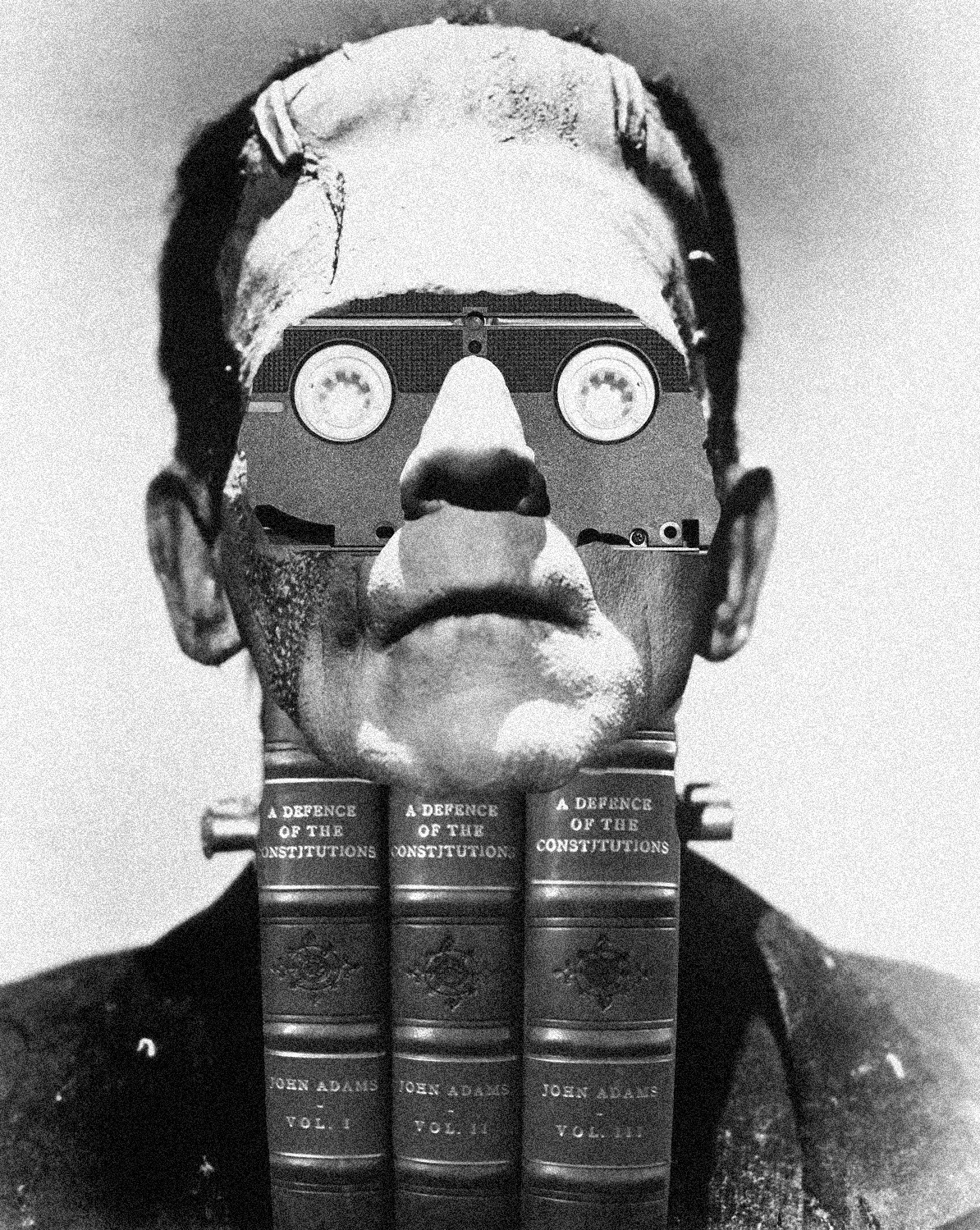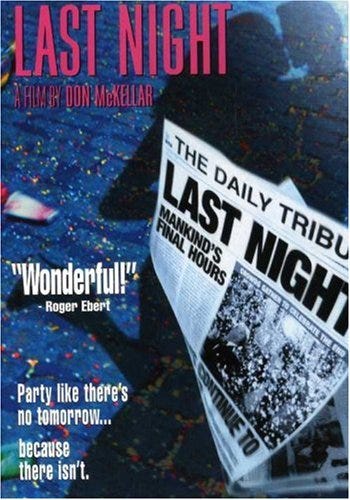essays
MEDIA FRANKENSTEIN: Manmade Apocalypse
M

A Monstrous Primer: In Frankenstein (1818), Mary Shelley has Victor Frankenstein say the following about the creature he has labored among “the unhallowed damps of the grave” to create: “How can I describe my emotions at this catastrophe, or how delineate the wretch whom with such infinite pains and care I had endeavored to form? His limbs were in proportion and I had selected his features as beautiful. Beautiful! — Great God! His yellow skin scarcely covered the work of muscles and arteries beneath; his hair was of a lustrous black, and flowing; his teeth of a pearly whiteness; but these luxuriances only formed a more horrid contrast with his watery eyes, that seemed almost of the same color as the dun white sockets in which they were set, his shriveled complexion, and straight black lips.” As soon as the doctor has glimpsed his creation, he can no more regard its components as separate; much like the life he calls down from the sky to make his creature walk and breathe, the creature’s physiognomy is elemental and eternal. And so if “all mankind is of one author and is one volume,” as John Donne says, we at Electric Literature believe that all art is part of the same monstrous body, disparate yet complementary. In that spirit, this biweekly column will devote itself to illuminating the gorgeous and grotesque connections between outwardly different works of art, organized around a theme. The column means to recommend an aesthetic experience to the reader. She might, for example, read the book while listening to the record and then watch the movie. Or abide with the catalog raisonné while listening to the record before watching the movie and reading the book — in any order she so chooses. The Head, the Torso and the Legs will go to make the creature whole. Alternative Cuts, every posting, will follow.
Media Frankenstein #1: Manmade Apocalypse
THE HEAD: Last Night, dir. Don McKellar (1998)
What if you knew the precise date and time that the world as you know it would cease to exist?
Would you spend your last hours on this earth with your loved ones, staging a drear and unseasonal Christmas? Or crossing off acts on your sex bucket-list like bedding your high school French teacher, perhaps, or a middle-aged virgin you picked up online? Would you run blood-drunk through the streets, shooting down strangers and toppling buses? Or would you relax in a chair on your roof with an old record player and a glass of red wine, cherishing the solitude we carry with us always, acknowledging solitude, making it yours? Such are the circumstances of Canadian director Don McKellar’s wonderfully subversive and curiously warm pre-apocalyptic film Last Night, which boasts a stellar indie cast the

likes of Sandra Oh, Sarah Polley and body-horror auteur David Cronenberg, who plays a power-company owner calling all of his customers (and many of the film’s characters) to console them: “I hope you’re doing well and spending these final hours in peace with your loved ones. Rest assured that we will make every effort to keep the gas flowing right until the end.” Herein lies the film’s tenderhearted gallows humor, which only grows more wrenching the closer we get to the final countdown. Every character’s leave-taking of another is weighted with agonizing foredoom, including a scene in which one male bro-friend rejects the sexual advances of his pal before saying: “See ya.” The pal’s response: “No you won’t.” In many ways it’s the film’s glib comedy juxtaposed with its unrepentant darkness that hits the viewer so hard, utilizing the funny/sad dichotomy of authors such as George Saunders and filmmakers such as Bobcat Goldthwait. By default the film’s characters are resigned, and yet their behaviors and choices belie them; with a couple exceptions, they’re terribly hopeful. And although, as in many of the best end-times narratives (see Cormac McCarthy’s The Road), we never get the precise reason for the world’s demise, by the end of the film that reason seems ultimately so far from the point that maybe we’re better off not knowing. We make our own apocalypse, regardless of whether or not we have caused it.
THE TORSO: Godspeed You! Black Emperor’s F ♯ A ♯ ∞ (1997)

It should come as little surprise that a heavily modified cut of the track “East Hastings” taken from Godspeed You! Black Emperor’s first record F ♯ A ♯ ∞ (pronounced: “F sharp, A sharp, Infinity”) is not only from a Canadian band, but also features in the beginning of Danny Boyle’s meth-zombie opera 28 Days Later (2002), in the scene where Cillian Murphy shambles in disbelief through the streets of an abandoned London. The scene is telling of the existential melancholy at the heart of the record, itself a sort of paean to the end-times — not before the last hour or in those that stretch after, but as the end is going down. Following in the footsteps of Mogwai and Rodan, the Montreal-based post-rock band Godspeed You! Black Emperor summons nothing less than a glockenspiel, horn, violin, slide guitar, Swans-esque industrial clamor and loop tracks of a raving messianic street preacher to do its business over the course of a full hour and change. The first track “Dead Flag Blues” begins with the voice of a man intoning over string instruments: “The car’s on fire and there’s no driver at the wheel. And the sewers are all muddled with a thousand lonely suicides. And a dark wind blows.” He goes on to say: “The skyline was beautiful on fire. All twisting metal stretching upwards. Everything washed in a thin orange haze.” You might be reading Baudelaire. Until the first “movement” dissolves — Godspeed writes not songs, but movements — and the music ascends, quiets down, ripples outward, before rising again in a fog of reverb; becomes the only thing you hear (if you are listening to it right). The universe’s entropy begins to swirl around your head. Yet much as in the film Last Night, the music is never all dark as with Swans or Godspeed’s electrified cousin Neurosis, but spry and orchestral and cautiously mournful, a last living wake for a vanishing world.
THE LEGS: Oryx & Crake by Margaret Atwood (2003)

If Last Night evokes the pre-apocalyptic world and Godspeed’s F ♯ A ♯ ∞ the apocalypse itself then Oryx & Crake, the first novel in fellow-Canadian Margaret Atwood’s MaddAddam Trilogy, takes us on a final descent into darkness, the world in the wake of extended decay. The novel centers around a character named Snowman, formerly Jimmy, who after years of living ferally among the wastes of what used to be planet earth has come to resemble a sort of Bigfoot, prolifically hairy, covered in superannuated bug-bites and clothed in a “dirty bedsheet,” yet also sporting such remnants of civilization as a watch that no longer ticks and an “authentic-replica Red Sox baseball hat.” Moving back and forth in time between Snowman’s attempts in the present to navigate a world populated only by genetic splices (Pigoons, Wolvogs, Rakunks and a breed of uncanny, lab-grown humans called Crakers), and the doomsday-precipitating events that took place in the past among Snowman himself, an enigmatic girl named Oryx and a sociopathic prodigy named Crake, the novel establishes a direct correlation between the Then and the Now, the World and the not-World, which is nothing if not chilling in its oblique resemblance to what will probably go down within the next century or so if we don’t get our shit together quick. Yet in spite of its vibrant colors and charnel-house comedy, Oryx & Crake may be one of the bleakest eschatological narratives ever penned, bleaker even than McCarthy’s The Road (a book which contains more than its own fair share of cautious optimism), though both books are creation myths. Snowman, its hero, is wholly alone, foraging among the ruins: “[Snowman] scans the horizon, using his one sunglassed eye: nothing. The sea is hot metal, the sky a bleached blue, except for the hole burnt in it by the sun. Everything is so empty. Water, sand, sky, trees, fragments of past time. Nobody to hear him. ‘Crake!’ he yells. ‘Asshole! Shit for brains!’ … No answer, which isn’t surprising. Only the waves, wish-wash, wish-wash. He wipes his fist across his face, across the grime and tears and snot and the derelict’s whiskers and sticky mango juice. ‘Snowman, Snowman,’ he says. ‘Get a life.’” And while the mystery of how Snowman is able to survive the apocalypse, not to mention the reason the world has to end Atwood by and by reveals, such answers do nothing to alleviate either the reader or Snowman’s existential terror in the face of a barren eternity. Yet Snowman continues to stockpile supplies, to curse his scorched, unlucky stars, to teach the Crakers what he knows, “pedagogue, soothsayer and benevolent uncle.”
What <em>Last Night, </em>F ♯ A ♯ ∞, and <em>Oryx & Crake </em>all seem to be suggesting, apart from a gleefully mordant brand of Canadian fatalism, is the tragedy not that the world has to end, or that when it does we will likely have caused it but the tragedy, rather, that we as a species will be compelled to soldier on.
The human comedy plays out, whether or not we are actively laughing.
Alternative Cuts:
(The Hunger Games Trilogy by Suzanne Collins; The Pixies’ Doolittle (1998); A Boy and His Dog, dir. L.Q. Jones (1975))
(The Road by Cormac McCarthy (2006); Igor Stravinsky’s The Rites of Spring; Goya’s “black paintings”)
(Pastoralia by George Saunders (2001); Miracle Mile dir. Steve de Jarnett (1988); Deltron 3030’s City Rising from the Ashes EP (2013)
(Zone One by Colson Whitehead (2011); 28 Days Later dir. Danny Boyle (2002); The Misfits’ Earth A.D./Wolf’s Blood (1983)
In Two Weeks: Ghostbusters









